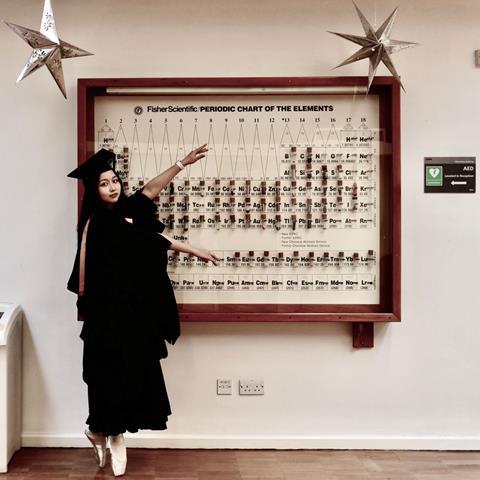Attracting and retaining international talent is proving to be a key factor in the scientific success of the Netherlands. But how do you ensure talent retention? And what role can the KNCV play here? These are the questions that intern Stacie He has been exploring for the past six months.
Stacie He (pictured) is a master’s student in Science Communication at Utrecht University and holds an undergraduate degree in chemistry from England. As part of her internship with the KNCV, she investigated the position and needs of international chemists in the Netherlands, as well as the potential role of the KNCV in supporting this community – a subject to which she could relate as an international herself. Her qualitative research provided valuable insights that will help shape the future direction of the KNCV.
On top
Literature shows that Dutch researchers are among the top in their field worldwide. According to publisher Elsevier, these achievements are partly due to collaborations with international institutions and companies, as well as the attraction of international talent to the Netherlands. While attracting talent is not much of an issue for the Netherlands, He’s target audience analysis reveal that the challenge lies in retaining these chemists.
Although international students and expats certainly intend to stay – 90% of the sixty surveyed international chemists see potential in continuing their careers in the Netherlands – the reality is different. A 2016 Nuffic study shows that only 36% of international students in the natural sciences are still living in the Netherlands five years after graduation. To ensure the progress and impact of the Dutch chemistry community, it is therefore crucial to focus on retaining chemistry talent.
Barriers and needs
The survey reveals that more than three-quarters of the respondents face challenges related to integration. Language barriers and the lack of a social network are the most significant obstacles. Improving integration is therefore crucial for retaining chemists in the Netherlands. The international participants in the study expressed a need for language courses, access to sufficient information in English and networking opportunities within the Dutch academic and industrial sectors. According to them, current onboarding programs often fall short in providing the necessary support. The KNCV board sees an important role for the association in addressing these needs.
A society for all chemists
Jan-Willem Toering, Director of the KNCV, is pleased with the research results. ’The KNCV aims to be a society for all chemists based in the Netherlands, not just for Dutch chemists. The findings of this study are a clear signal that foreign chemists in the Netherlands need more support in the integration process.’ The KNCV is taking these signals to heart. Currently, an onboarding program is being developed for both Dutch and international chemists. Additionally, the KNCV website will soon undergo a significant update, making all information automatically available in English. The goal is to make the society more accessible to all chemists in the Netherlands, and the KNCV will continue to support their growth and development.














Nog geen opmerkingen